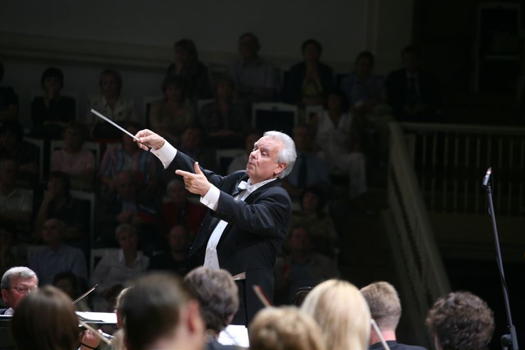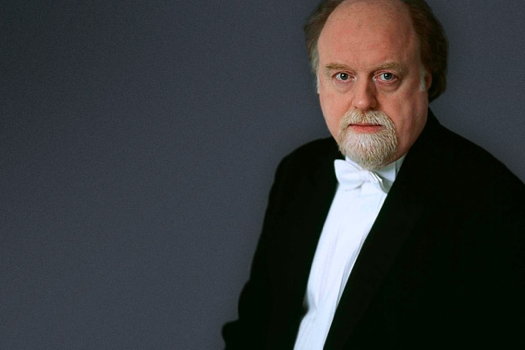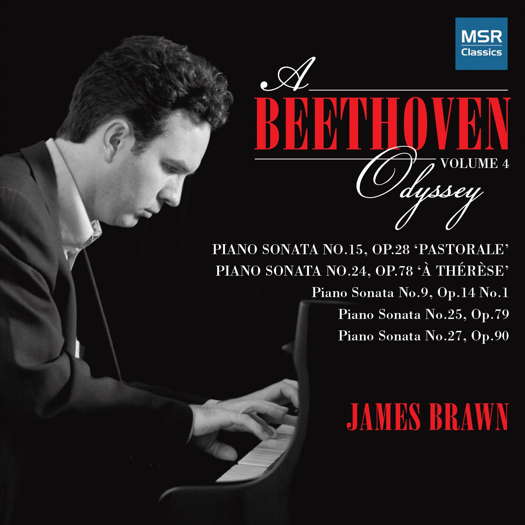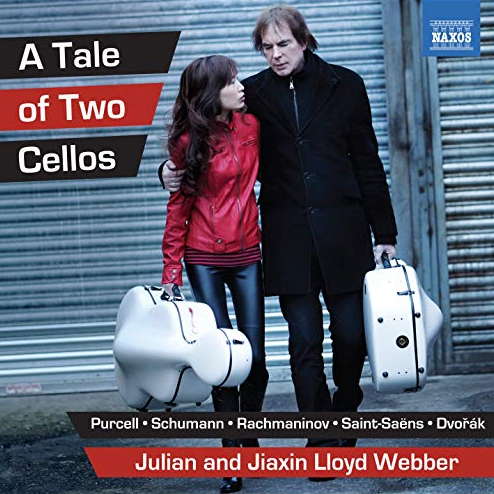- Antônio Carlos Gomes
- Glazounov
- Cajkovskij
- Kumiko Ida
- Sarah Gibson
- Iuventus String Quartet
- Gamper Festival of Contemporary Music
- Paris Museum of Music
A Vivid Sense of Theatricality
MIKE WHEELER listens to
Tchaikovsky, Rachmaninov and Khachaturian from
Peter Donohoe and the Moscow Philharmonic Orchestra
conducted by Yuri Simonov
The Moscow Philharmonic Orchestra and conductor Yuri Simonov have been popular visitors to Nottingham's Royal Concert Hall for some years, now, and and they launched the new season (3 October 2019) with panache.
Tchaikovsky's Marche Slave can come across as little more than a bombastic showpiece, but this was an often unexpectedly thoughtful account, right from its subdued opening. The middle and end themes were jaunty with more than a touch of the municipal bandstand about them, which felt completely right, and the final acceleration wasn't allowed to run away with itself. Simonov's conducting style is an idiosyncratic law unto itself - more on that later - but the surge in violin tone in response to a simple arm gesture, at one point, was enough to demonstrate his rapport with the players. And he knows when to get out of their way and let them get on with it.

Yuri Simonov
No 4 is quickly becoming my favourite Rachmaninov Piano Concerto, partly because of the very succinctness that has perhaps made it less popular in the past than Nos 2 and 3. In the first movement, Peter Donohoe had me wondering how much sublimated jazz there was in the solo part. Had Rachmaninov heard much jazz by the time he was working seriously on the piece - we know he later became an Art Tatum fan - or were some jazzers emulating him? The collapse of the big tune near the end was properly startling, and there were some delectable orchestral details elsewhere - the rising horn and tuba phrase shortly afterwards, the first violins' beautifully clear reprise of the opening theme.
The start of the second movement was notable not only for Donohoe's thoughtfulness and concentration, but also the warmth of the low-lying string tone, all of which added to the impact of the central eruption. Donohoe began the finale with the suggestion of Rachmaninov piecing it all together before it got under way. Some subtle and delicate percussion playing enhanced the more mysterious, exploratory moments, while the big gestures were given their opulent head.

Peter Donohoe
Donohoe's encore, Tchaikovsky's Humoresque, Op 10 No 2, was borrowed by Stravinsky in his ballet score The Fairy's Kiss. And that led neatly to the all-ballet second half. A sequence of numbers from Acts I and II of Tchaikovsky's Swan Lake - not always the obvious ones, and not in their original dramatic sequence - began with the Introduction to Act I, with Alexander Abashkin's eloquently phrased oboe solo suggesting the tragedy to come. Simonov was practically performing his own one-man ballet at times - has he ever been a dancer of any kind himself?, I wondered. The performances had a vivid sense of theatricality, culminating in the Act I Dance with Goblets, a polonaise delivered with abundant swagger and brilliance.
Then we moved on to the more raw, visceral world of Khachaturian's Gayaneh. A brightly coloured Dance of the Maidens brought out its march-like character, and Sergey Turmilov's flute solo in the Lullaby had an agreeable low-register huskiness. The Sabre Dance had the right degree of no-holds-barred brashness, with the solo saxophone (not separately credited) and trumpet players standing at appropriate moments. Soulful string playing in Gayaneh's Adagio calmed things down, before the uninhibitedly raucous Mountaineers' Dance. Ayesha's Dance was a haunting upbeat to the breathless concluding Lezginka.
The Swan Lake excerpts included two waltzes, and the encores provided two more: from Khachaturian's Masquerade incidental music, and Tchaikovsky's Sleeping Beauty, both projected with elan.
Copyright © 12 October 2019
Mike Wheeler,
Derby UK





